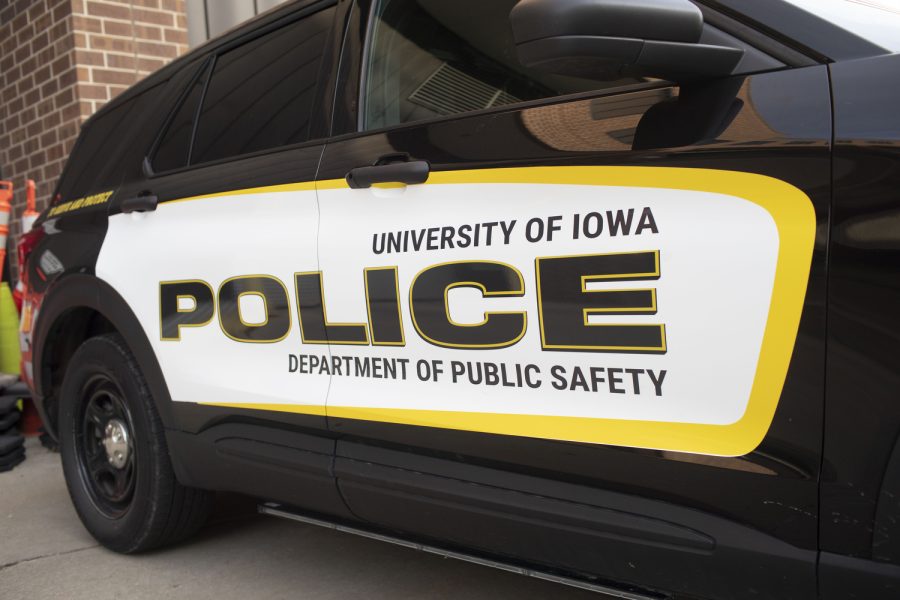UI Office of Campus Safety rebrands to focus on mental health, crisis response
The Office of Campus Safety is restructuring to assist students and the community better.
A University of Iowa police car is seen on Sunday, April 9, 2023.
April 9, 2023
The newly rebranded University of Iowa Office of Campus Safety, which houses all university safety services, will change crisis intervention responses and more UI executive officer oversight.
The idea to rebrand the UI Department of Public Safety started in August 2021 when the UI’s Reimagining Campus Safety Action Committee delivered recommendations to UI President Barbara Wilson about the future of campus safety.
The committee investigated the department and found areas in which it needed improvement. In the committee’s final report, four items were recommended:
- Provide options for mental health, basic needs, crisis intervention, and follow-up that does not require law enforcement response.
- Invest in mental health, case management, and basic needs safety.
- Create a Presidential Campus Safety and Accountability Board that supports marginalized campus members and the UI community.
- Align the UI with community safety protocols to create a safer response approach through collaboration with public safety and community officials.
The realignment also follows the 2022-2027 UI Strategic Plan, which aims to support the well-being and mental health on campus to assist students, faculty, and staff.
The Reimagining Campus Safety Implementation Team formed in November 2021 and organized itself into three work groups to help implement the committee’s four recommendations.
Several goals this year have been reached to achieve the four recommendations. Assistant Vice President of Campus Safety Mark Bullock explained how the combination of the Threat Assessment Team and Public Safety through the new threat awareness group, called the Campus Threat Awareness Round Table, has improved the organization’s ability to work quickly.
RELATED: UI to combine all safety services into one organization
The Campus Threat Awareness Round Table consists of members from campus safety who regularly meet to improve communication regarding high-risk situations.
Bullock said that the additional communication helps create a feedback loop that Campus Safety can use to continue improving its methods to serve the campus community best.
“We have all of the right perspectives on one team, but it’s great for us to meet with a student group and then to meet with this border group and then to even seek out other groups to meet with,” he said.
UI Director of Threat Assessment Eli Hotchkin was involved with the Reimagining Campus Safety Action Committee and said the realignment has helped streamline proactive and preventative measures.
“Overall, it’s been an amazing experience, and given our role of threat assessment, is really proactive to prevent violent incidents. It only makes sense to be a part of Campus Safety,” Hotchkin said.
The UI Threat Assessment Program has a multidisciplinary team working across campus to actively be involved with the community.
“In those embedded units, our goal is to have further communication and collaboration inside of those units. To bring up and kind of address those collaboratively and share that information with groups to collectively address situations that are almost always complex in nature,” Hotchkin said.
Hayley Bruce, UI Campus Safety’s assistant director for communication and external relations, said that the realignment is all about increasing collaboration and communication for the UI community.
“I think especially creating some of these groups, we’re not just able to share our ideas with them and get feedback, but they’re able to share how they’re feeling, what they’re seeing, and what they’re hearing with us is extremely valuable,” Bruce said.
The UI is still working to provide alternative transportation options for students experiencing a mental health crisis, constructing a new space for campus safety services at the University Capitol Centre, and identifying funding sources to relocate cultural and resource centers.
A five-year plan was also implemented to help support students’ mental, physical, emotional, and social well-being. Additionally, the formation of a Campus Safety Improvement Board is ongoing and will be appointed by UI President Wilson.
The last recommendation has seen completion in areas of a strategic communication plan to share messages about safety and security throughout the year to increase community knowledge.



